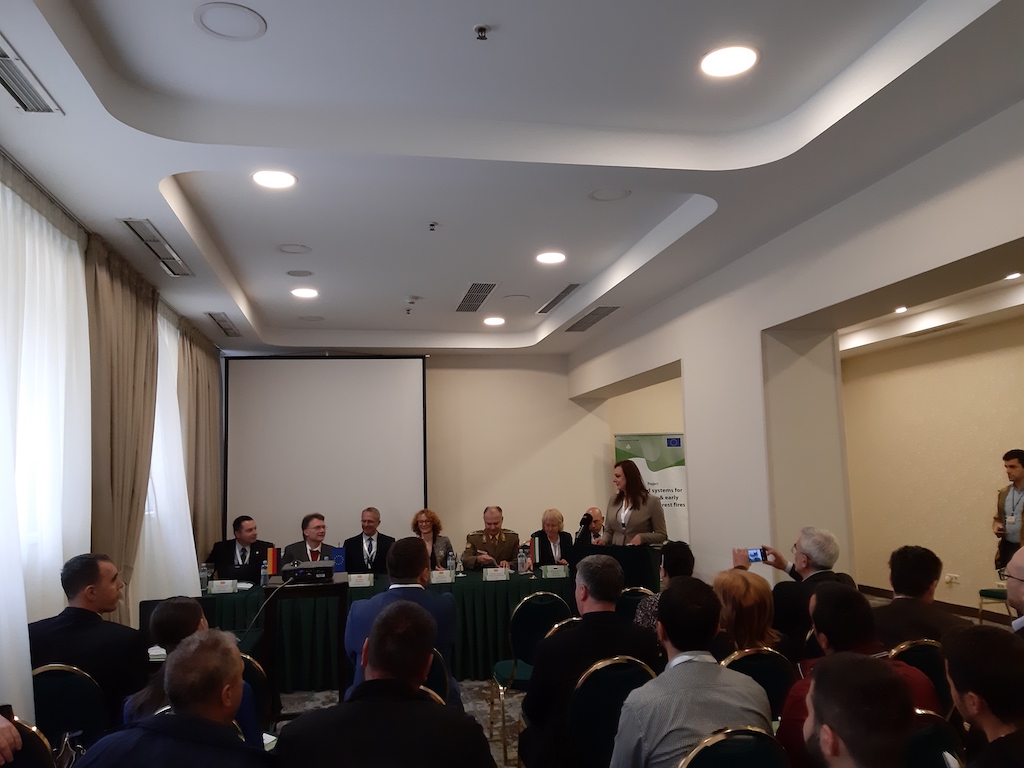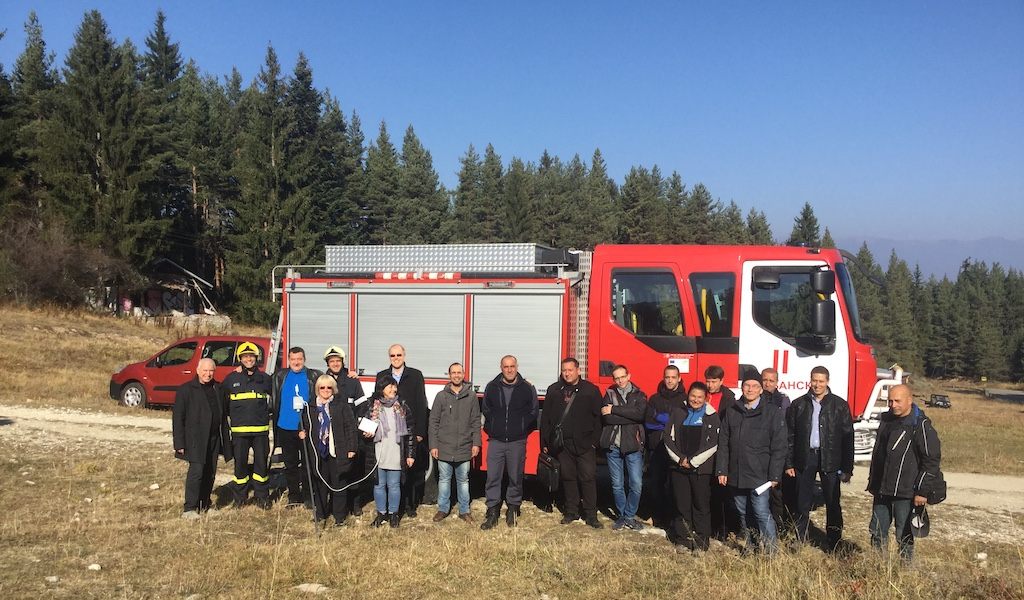ASPires Project. Workshop in Skopje
The ASPires seminar was held from the 20 to 22 March 2019 at Best Western Hotel in Skopje, Republic of North Macedonia.
Guests of the seminar from North Macedonia were Ministery of Defence, Military Academy, Army Forces, representatives from the national parks in North Macedonia, Mavrovo and Pelister, the Directorate for protection and rescue, the Ministry of Agriculture, Forestry and Water Economy, the Crisis Management Center, Public Enterprise North Macedonian Forests, Ministy of Enviroment and Physical Planning. Guests from Kosovo were representatives from Emergency Management Agency, Climate Change and Environment issues and Weather Forecaster in Hydrometeorological Institute of Kosovo. The delegation from Bulgaria is led by engineer Dimitar Klecherov, director of the fire department in Bansko, Bulgaria.
The seminar was attended by state television and local medias.
ASPires project. Bansko. Interview with Prof. Dr. Peter Peinl
Prof. Dr. Peter Peinl, please tell us briefly what is the purpose of the ASPires project?
Protecting forests is of paramount importance to us, the people, to be able to exist in this world. Forests are the only ones that purify the air from carbon dioxide and create oxygen.
Surely one of the reasons for the climate problems is the reduction of the forest massifs. In this process, people's guilt is great - unintentionally or deliberately.
The European Commission is paying serious attention to this problem. One of the areas in which the work is done is the protection of forests from fires.
The ASPires project aims to develop early forest fire detection technology that has no geographical constraints and uses available technical means and forest fire detection know-how.
The ASPires project is funded by the European Commission and by us, the Beneficiaries of this project. The project started in May 2017 and will end in April 2019.
By the end of the project, important, unified technology will be available, that will offer high-tech facilities and will allow the creation of a single European real-time system for early detection of forest fires.
On the project page https://www.aspires.eu you can get more information about this project.
Prof. Dr. Peter Peinl, who are the participants of this project?
A consortium was set up to implement the project ASPires. This consortium is run by the University of Applied Sciences in Fulda, Germany. The consortium also includes the Macedonian Military Academy, the Bulgarian companies ICB, COMICON and the Bulgarian cluster NCITES.
We created a sophisticated organization of work. All project participants provided their leading specialists and technical resources.
A main participant in the project are our end users from FYROM, Bulgaria and Germany. These are the organizations that have devoted time and resources to participate in experiments demonstrating the credibility and usability of the technology.
We are very grateful to the participants:
+ From FYROM: Crisis Management Center; Ministry of Environment; Ministry of Agriculture, Forests and Waters; National Parks Mavrovo and Pelister;
+ On the Bulgarian side the Fire Safety and Civil Protection General Directorate of the Ministry of Interior is involved
+ On the German side, the Interior Ministry is involved.
Today, we are about 6 months from the end of the project and we are fully confident in its successful ending.
Prof. Dr. Peter Peinl, will you tell us about the technical side of the project. What is the technical means and technologies to achieve the project goals?
We have created a sophisticated architecture that allows to obtain information about the presence or prerequisites of forest fires. This is a cloud technology, that allows all parts of the infrastructure to obtain or read a real-time data. The system does not impose territorial limitations. There are also the conditions for further analysis of the data obtained, which will result in isolation of false alarms and early notification to the competent authorities.
Modern sensory devices are located in the forest massifs to detect forest fire symptoms and provide this information in real time.
We also use modern infrared cameras and accessories to observe a large array of forests.
Drones are also included and equipped with specialized gateways for sensor data gathering as well as equipment for detection and surveillance of forest fires.
The technical means used are available on the European market. ASPires platform integration is unique and novel. This gives us reason to believe that the ASPires project is completely real and applicable.
Prof. Dr. Peter Peinl, tell us a little about you. Are you in Bulgaria for the first time?
I am a professor at the University of Applied Sciences in Fulda, Germany. I specialize in dealing with data bases and related technologies.
In Germany, we attach great importance to environmental concerns and therefore I was interested in the ASPires Project and with satisfaction I accepted to be the head of the consortium. This project is a great scientific challenge.
I am not in Bulgaria for the first time. I work with the New Bulgarian University since 15 years and teach a course to the students every year.
Bulgaria is a wonderful country with many natural sights, a rich cultural heritage and wonderful people. It's always very exciting when I'm here.
I would be glad if Bulgaria is one of the first countries of the European Union to implement the ASPires project.
ASPires Project. Introduction. Workshop in Bansko, Bulgaria
On November 9, 2018 in the town of Bansko, Bulgaria the third specialized seminar for the end users of the project ASPires was held.
The purpose of the seminar was to disclose the results achieved by the project.
This workshop demonstrated the work of the ASPires platform live. Live demonstrations were organized with the invaluable assistance of the Bulgarian National Emergency Management Authority, the Fire Safety and Civil Protection Chief Directorate, the Ministry of Interior of Bulgaria.
In the area "Chalin Valog" in the vicinity of the town of Bansko on the part of COMICON special sensors were installed, related to the early detection of signs of forest fire.
The ASPires-GEO module, designed for the early detection of forest fires by using an infrared camera and additional hardware and software equipment, was installed on the part of NCITES.
On the part of the fire command, a forest fire was simulated by firing balled straw.
Within a few seconds the fire was recognized by the installed equipment.
The alarms that were triggered were automatically sent via SMS to the mobile phone numbers provided by the attendees. The experiment showed that the basic concepts underlying the ASPires platform are correct.
Information about the ASPires workshop was published in the Specialized electronic magazine for fire safety and protection of the population SOS112, issue 11-18/26.11.2018, page 17-18, language Bulgarian.
Presenting of the new gateway for LoRa and MQTT
Aleksandar Savov, General Manager of Comicon Ltd. is presenting the new gateway for LoRa and MQTT. The product is new and unique on the IoT market aiming to connect long range sensors and a cloud through message queueing telemetry protocol. This promising Internet of Things technology works on drones and could be fixed on walls, towers, trees, roofs, depending on the applications. The range of possible implementations is big starting from forest fire detection, going through environment analysis, home automation, agriculture management, industry automation etc.


